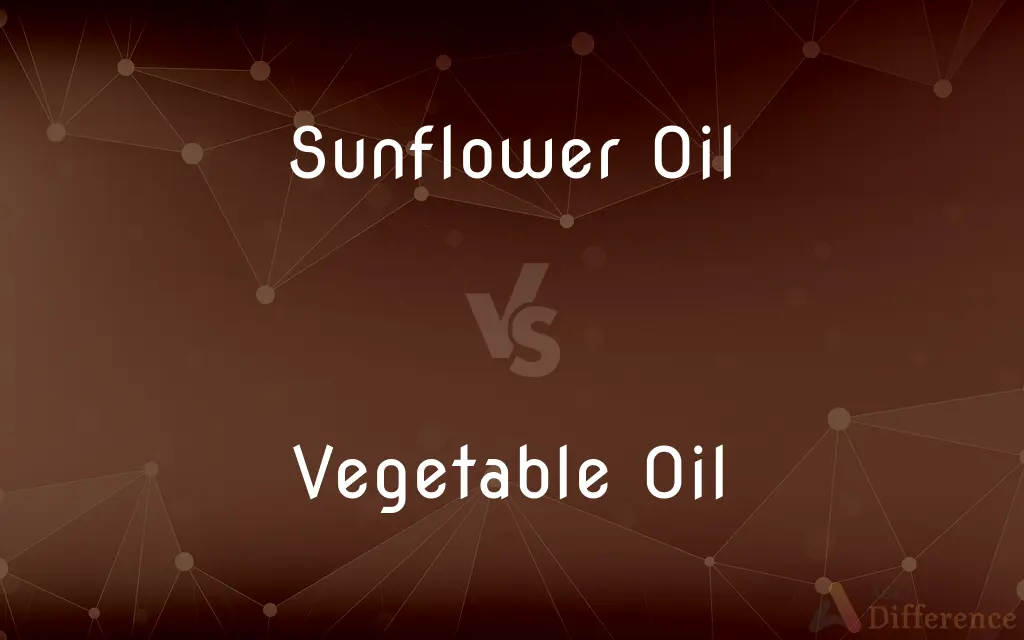Sunflower Oil vs. Vegetable Oil — What's the Difference?
By Tayyaba Rehman — Published on October 16, 2023
Sunflower Oil is derived exclusively from sunflower seeds, while Vegetable Oil is a generic term for oils extracted from various plant sources.

Difference Between Sunflower Oil and Vegetable Oil
Table of Contents
ADVERTISEMENT
Key Differences
Sunflower Oil is specifically extracted from the seeds of sunflower plants. It's known for its light taste and frying capabilities. Vegetable Oil, on the other hand, is a broader category, encompassing oils extracted from a variety of plants, including soybeans, canola, and others.
When considering health benefits, Sunflower Oil is often touted for its high content of vitamin E and low saturated fat. Vegetable Oil's nutritional profile, however, varies depending on the blend of plant oils it contains, which can range from soybean to palm to coconut.
For cooking, Sunflower Oil is a favorite in many kitchens due to its neutral flavor, making it versatile for various dishes. Vegetable Oil, depending on its source or blend, might have a more distinct taste or smoking point, impacting its suitability for certain cooking methods.
Sunflower Oil, being a specific type, offers consistency in flavor and health benefits. Vegetable Oil, given its generic nature, may not offer such consistency unless its exact sources or blends are specified.
In supermarkets, Sunflower Oil is typically labeled explicitly, ensuring consumers know they're purchasing oil derived from sunflower seeds. Vegetable Oil, conversely, requires a closer look at the ingredient list to discern the specific plant sources used in its creation.
ADVERTISEMENT
Comparison Chart
Source
Extracted from sunflower seeds
Derived from various plants
Nutritional Profile
High in vitamin E, low in saturated fat
Varies based on plant sources
Taste
Neutral
Can range from neutral to distinct, based on blend
Use in Cooking
Versatile due to its neutral flavor
Suitability varies based on smoking point & flavor
Labeling in Supermarkets
Explicitly labeled
Ingredient list needed to discern plant sources
Compare with Definitions
Sunflower Oil
A popular cooking oil known for its high vitamin E content.
For a healthier choice, he drizzled Sunflower Oil over his salad.
Vegetable Oil
An oil used in cooking, derived from one or more plant sources.
She checked the label to see which plants the Vegetable Oil was made from.
Sunflower Oil
A commonly used oil in kitchens due to its beneficial nutritional properties.
For deep frying, she always chose Sunflower Oil because of its lightness and health benefits.
Vegetable Oil
A staple in many kitchens due to its versatility in cooking methods.
For her baking, she always preferred using a light Vegetable Oil.
Sunflower Oil
The oil derived solely from the seeds of the sunflower plant.
Sunflower Oil has a light consistency, making it perfect for dressings.
Vegetable Oil
A broad category of oil, encompassing multiple types based on its source.
Not all Vegetable Oil is the same; some are healthier than others.
Sunflower Oil
An oil recognized for its neutral flavor and versatility in dishes.
Using Sunflower Oil, she ensured the cake had a moist texture without an overpowering taste.
Vegetable Oil
A generic term for oils extracted from various plants.
He added Vegetable Oil to the pan to start the stir-fry.
Sunflower Oil
A light-tasting oil extracted from sunflower seeds.
She used Sunflower Oil to fry the potatoes for a crisp finish.
Vegetable Oil
An oil with a varying nutritional profile based on its plant origins.
To ensure health benefits, he always chose a Vegetable Oil with a known source.
Common Curiosities
What plants can be the source of Vegetable Oil?
Vegetable Oil can be derived from various plants, including soybeans, canola, corn, and more.
Is Sunflower Oil considered a type of Vegetable Oil?
Yes, Sunflower Oil is a specific type of Vegetable Oil as it's derived from a plant source.
Can I use any Vegetable Oil for baking?
Most Vegetable Oils can be used for baking, but it's best to choose one with a light and neutral flavor.
What is the primary source of Sunflower Oil?
Sunflower Oil is exclusively extracted from sunflower seeds.
Which oil is better for frying?
Sunflower Oil is often preferred for frying due to its light taste and higher smoke point, but some Vegetable Oils can also be suitable.
Can Vegetable Oil be a blend of multiple plant oils?
Yes, some Vegetable Oils are blends of oils from different plant sources.
How can the health benefits of Vegetable Oil vary?
The health benefits of Vegetable Oil depend on its source, with some oils being richer in certain nutrients or having a healthier fat profile.
Are there any allergen concerns with Sunflower Oil?
While rare, some individuals may be allergic to sunflower seeds and should avoid Sunflower Oil.
Is Sunflower Oil richer in vitamin E?
Yes, Sunflower Oil is known for its high vitamin E content.
Is Sunflower Oil commonly available in supermarkets?
Yes, Sunflower Oil is widely available in supermarkets and is often explicitly labeled.
How can I determine the source of a Vegetable Oil?
Checking the ingredient list on the label will indicate the specific plant sources of the Vegetable Oil.
Which oil has a more neutral flavor?
Sunflower Oil typically has a more neutral flavor, while the taste of Vegetable Oil can vary based on its blend.
Why might someone choose Sunflower Oil over other Vegetable Oils?
Sunflower Oil's neutral taste, health benefits, and versatility in cooking can influence the choice.
How do I store Sunflower Oil and Vegetable Oil?
Both should be stored in a cool, dark place, preferably in airtight containers to prolong shelf life.
Are there any specific cuisines that prefer Sunflower Oil?
Sunflower Oil is versatile and used worldwide, but it's especially popular in Eastern European and Russian cuisines.
Share Your Discovery

Previous Comparison
In Vitro vs. In Vivo
Next Comparison
Dark Chocolate vs. White ChocolateAuthor Spotlight
Written by
Tayyaba RehmanTayyaba Rehman is a distinguished writer, currently serving as a primary contributor to askdifference.com. As a researcher in semantics and etymology, Tayyaba's passion for the complexity of languages and their distinctions has found a perfect home on the platform. Tayyaba delves into the intricacies of language, distinguishing between commonly confused words and phrases, thereby providing clarity for readers worldwide.











































